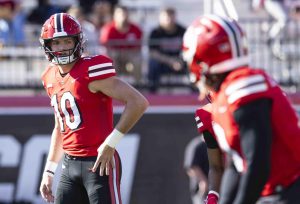Sloughing off southern stereotypes: The formation of the new south
March 21, 2018
As part of the inaugural installment of the Mahurin Honors College speaker series, Bowling Green’s own Sarah Mahurin delivered poignant commentary on “complicat[ing] what [she thought] are sort of easy or cheap stories that get told about the state of affairs on college campuses.”
Struck by her presence, I sat in awe as I listened to her flawless execution. Something else caught my attention: her distinct Southern accent.
Much like the topic of her presentation in complicating narratives, I wanted to also listen to her perspective as a Southerner in higher educational circles.
When the Q&A session had rolled around, I was able to ask Mahurin, the first woman dean of the Timothy Dwight College at Yale, how she commanded space in an Ivy League environment as a southerner. Giving an affirmative nod, she proceeded to recount her first humorous realization that she, indeed, was different as embodied by her southern lilt. She maintained that being southern is an integral part of her identity, something to be proud of.
Popular culture since the Civil War has perpetuated the stereotype that all southerners are “racist, hot-headed, too physical, violent, uncouth, loud, mean, undereducated—and proud of it.” But these stereotypes are particularly unfitting.
Having lived and worked in both New York City and Washington D.C., I experienced first-hand the dismissive attitudes towards Southern culture. I felt like I constantly had to vouch for my people and share with northerners our cultural gems ranging from our delicious foods, to our impressive contributions to art and culture to our renowned academic institutions. And yes, even our memorable southern-isms.
This is by no means a glossing-over of the injustices that characterized and continue to shape life below the Mason-Dixon line. By that same token, I refuse to sit back and let the narrative of northern utopia go unchallenged as racism, sexism, or homophobia is, inexcusably, everywhere. While the South has much to do to improve equity and mobility, the region is in the midst of forging a new path.
Some 82,000 black millennials moved to the South in 2014 to find opportunities in cities like Atlanta, Miami and Dallas. Forty percent of the aforementioned black transplants hailed from the Northeast. When citing reasons for the move, economic mobility and a lower-cost of living were the top reasons.
Similarly, a demographic shift in the LGBTQ community from the Coasts to inland, Republican dominated states has taken place. At 4.5% of the population, Louisville ranked 11th for the highest rate of LGBTQ-identifying peoples. Anti-discrimination LGBTQ provisions exist in Louisville, and the city has indicated a commitment in spurring LGBTQ tourism.
When describing Southern black society, one black professional in a New York Times piece noted that, “they’re [Southern black society] educated, they’re driven. I don’t think this is just a fad. I think this is something that has been on the come up for the last decade.”
I’d have to agree that this isn’t a fad either. As the South experiences a population boom, having accounted for 84.4% (in combination with the West) of the U.S. population growth between 2000 and 2010, the way we envision and talk about Southern identity must change. Southerners do not behave as a monolith. We are cultured, driven, and ambitious, and can be proud of where we come from. Is it really sweet iced tea if it isn’t southern style anyways?













